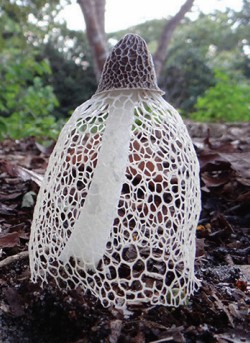Lifeasible provides tissue culture services for bamboo mushrooms. We collect the immature buds of high-quality wild bamboo mushrooms for tissue separation to prepare high-quality parent strains, and provide technical support for the collection of high-quality provenance and improved breeding of bamboo mushrooms.
Introduction of Bamboo Mushrooms
The bamboo mushroom (Dictyophora indusiata or Phallus indusiatus) is a rare edible fungus parasitic on the roots of dry bamboo. Its shape is slightly resembling net-shaped dry white snakeskin. It has a dark green cap, a snow-white cylindrical stipe, and a pink egg-shaped receptacle. It is nutrient-dense, richly fragrant, and delicious, and is known as the "Queen of Fungi". It contains a variety of amino acids, polysaccharides, vitamins, inorganic salts, etc. It has various health care functions such as immune regulation, anti-tumor, anti-inflammatory, anti-oxidation, anti-bacterial, lowering blood fat, anti-thrombosis, strengthening the spleen and stomach, and has the function of "scraping fat", so it is also a natural weight-loss drug.
 Fig. 1 The fruiting body of the bamboo mushroom. (Cabral T S, et al., 2018)
Fig. 1 The fruiting body of the bamboo mushroom. (Cabral T S, et al., 2018)
Our Tissue Culture Services for Bamboo Mushrooms
Lifeasible provides bamboo mushroom tissue culture services. We select the buds of seven or eight mature bamboo mushrooms or the tissue of bamboo mushrooms open umbrella for tissue separation and perform multiple differentiation cultivations to purify and prepare parent species, providing technical support and reference for the collection of high-quality provenance and the selection of improved varieties of bamboo mushrooms. Our services include but are not limited to the following:
- We provide tissue culture services for bamboo mushrooms to advance your research progress.
- We provide a variety of high-quality and stable bamboo mushroom strains for artificial domestication production.
- We provide bamboo mushroom breeding services. We will adopt the method of tissue separation of sawdust culture medium to propagate the strains and then screen out the parent strains that meet your requirements.
The Process of Our Bamboo Mushroom Tissue Culture
The quality of the strain is the most important factor in the quality of bamboo mushrooms. At present, the strains of bamboo mushrooms are mainly obtained by tissue separation. Lifeasible has rich experience in mushroom tissue culture. Based on the traditional tissue culture method, we have improved the tissue culture protocol to make it more suitable for bamboo mushrooms, thereby improving the quality of bamboo mushrooms. The program flow is as follows:

Advantages of Our Services
- The bamboo mushroom strains provided by our tissue culture have the characteristics of fast germination, early fruiting, tall and straight flower shape, long skirt, and high yield during cultivation, and can grow 3-4 tides of bamboo mushrooms a year.
- Our bamboo mushroom strains are high-quality wild varieties that have been cultivated through systematic breeding and domestication. They are stable, high-quality, and remarkably productive bamboo mushroom parent species that can be used for reproduction and production.
- Our bamboo mushroom strains are suitable for large-scale cultivation of various cultivation substrates, such as bamboo branches and leaves, branches of miscellaneous trees, corn stalks, cottonseed hulls, reeds, bean hulls, etc.
Contact Us
Lifeasible provides bamboo mushroom tissue culture services to provide high-quality strains for the artificial production of bamboo mushrooms which is of great significance for bamboo mushroom cultivation, resource utilization, and development. If you are interested in our services, please contact us for a more detailed service description.
Reference
- Cabral, T. S.; et al. Behind the veil-exploring the diversity in Phallus indusiatus s.l. (Phallomycetidae, Basidiomycota). MycoKeys. 2019, 58: 103-127.
For research or industrial raw materials, not for personal medical use!


 Fig. 1 The fruiting body of the bamboo mushroom. (Cabral T S, et al., 2018)
Fig. 1 The fruiting body of the bamboo mushroom. (Cabral T S, et al., 2018) 
